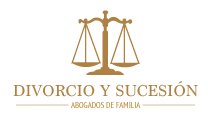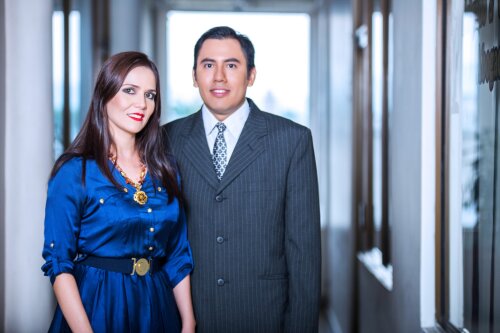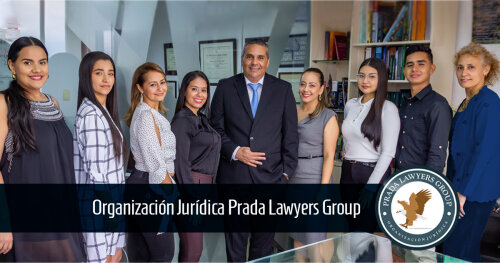Best Child Custody Lawyers in Bucaramanga
Share your needs with us, get contacted by law firms.
Free. Takes 2 min.
Free Guide to Hiring a Family Lawyer
List of the best lawyers in Bucaramanga, Colombia
About Child Custody Law in Bucaramanga, Colombia
Child custody law in Bucaramanga, Colombia, governs the rights and responsibilities of parents or guardians regarding the care and upbringing of their children following a separation, divorce, or other circumstances affecting parental presence. The law prioritizes the best interests of the child, focusing on their well-being, stability, and emotional health. Custody arrangements can be decided mutually by parents or, in cases of disagreement, by family courts. The main goal of Colombian child custody law is to ensure the child's fundamental rights are respected and upheld.
Why You May Need a Lawyer
Legal assistance is often required in child custody matters due to the complexities involved and the emotional nature of such cases. You may need a lawyer if you are experiencing any of the following situations:
- Divorce or separation where custody of children is contested
- Concerns about visitation rights or parenting time schedules
- Relocation or international child abduction concerns
- Questions about modifying existing custody arrangements
- Issues of child abuse, neglect, or unsafe living conditions
- Concerns about child support and related financial obligations
- Desire to formalize informal agreements to make them legally binding
- Parental alienation or obstruction of contact with your child
A family lawyer in Bucaramanga can help you navigate the legal process, represent your interests in court, and ensure your child's rights are protected.
Local Laws Overview
The Colombian Family Code (Código de Infancia y Adolescencia) and the Civil Code provide the legal foundation for child custody in Bucaramanga. Some key aspects of local child custody law include:
- Best Interests of the Child: All decisions must prioritize the child's welfare, emotional bonds, and stability.
- Types of Custody: Custody may be sole (exclusive to one parent) or shared (joint custody), depending on the circumstances.
- Parental Authority: Both parents generally retain rights and responsibilities, unless one parent is deemed unfit.
- Visitation: Non-custodial parents are usually granted visitation rights, except in cases where this is not in the child's best interest.
- Modification of Arrangements: Custody orders can be modified if there are significant changes in circumstances that affect the child's welfare.
- Child’s Wishes: Depending on their age and maturity, a child’s opinion may be considered by the court.
Frequently Asked Questions
What does "custody" mean in Bucaramanga?
Custody refers to the legal responsibility for a child's care and upbringing. This includes decisions about health, education, and general welfare, and can be held by one parent (sole custody) or shared by both (joint custody).
How is custody decided if parents cannot agree?
If parents cannot reach an agreement, the case goes before a family judge, who will base the decision on the best interests of the child, evaluating factors such as emotional bonds, each parent's ability to provide care, and the child's stability.
Can a child choose which parent to live with?
The child's wishes may be considered, especially if they are over the age of 12, but the final decision rests with the judge, who will consider the child's maturity and best interests.
Is joint custody common in Bucaramanga?
Yes, Colombian law generally encourages joint parental responsibility unless there is a valid reason for sole custody, such as neglect, abuse, or incapacity.
What rights do non-custodial parents have?
Non-custodial parents generally retain visitation rights and a say in significant decisions relating to the child's upbringing, unless restricted by the court for the child's safety.
How can custody arrangements be modified?
Modifications require demonstrating a substantial change in circumstances affecting the child's welfare. This must be done through a legal process, often with the help of a lawyer.
Can grandparents or other relatives seek custody?
Yes. If both parents are absent, unfit, or unable to care for the child, relatives such as grandparents can petition the court for custody.
What happens if one parent wants to relocate with the child?
Relocation affecting custody or visitation rights typically requires court approval. The parent must demonstrate that the move serves the child’s best interests and consider the non-custodial parent's access.
What should I do if I suspect my child is at risk?
If you believe your child is in immediate danger, contact your local police or the ICBF (Instituto Colombiano de Bienestar Familiar) for urgent intervention. Then seek legal advice as soon as possible.
How long does the custody process typically take?
There is no fixed timeline. Simple, uncontested cases may be resolved quickly, while contested or complex cases can take several months, depending on the circumstances and court schedules.
Additional Resources
- Instituto Colombiano de Bienestar Familiar (ICBF): The ICBF provides child protection services, guidance, and mediation for families in conflict.
- Comisarías de Familia: Local Family Bureaus in Bucaramanga offer assistance with domestic issues, protection for vulnerable children, and emergency interventions.
- Bucaramanga Family Courts: The family courts manage custody disputes and related proceedings.
- Legal Clinics and University Programs: Many universities in Bucaramanga offer free or low-cost legal advice for families in need. Examples include Universidad Industrial de Santander and Universidad Autónoma de Bucaramanga.
- Private Family Lawyers: Strongly recommended for complex or contentious cases, family lawyers can guide you through the legal process and advocate for your interests.
Next Steps
If you need legal assistance with a child custody matter in Bucaramanga, start by gathering any relevant documents, such as birth certificates, previous custody agreements, and records of parental involvement. Reach out to a qualified family lawyer who can evaluate your case and explain your rights and options. If your situation is urgent or involves risk to a child, contact the ICBF or local authorities immediately. For less urgent matters, you can also visit a local Comisaría de Familia for initial guidance and mediation services. Always prioritize the best interests and well-being of the child in any action you take.
Lawzana helps you find the best lawyers and law firms in Bucaramanga through a curated and pre-screened list of qualified legal professionals. Our platform offers rankings and detailed profiles of attorneys and law firms, allowing you to compare based on practice areas, including Child Custody, experience, and client feedback.
Each profile includes a description of the firm's areas of practice, client reviews, team members and partners, year of establishment, spoken languages, office locations, contact information, social media presence, and any published articles or resources. Most firms on our platform speak English and are experienced in both local and international legal matters.
Get a quote from top-rated law firms in Bucaramanga, Colombia — quickly, securely, and without unnecessary hassle.
Disclaimer:
The information provided on this page is for general informational purposes only and does not constitute legal advice. While we strive to ensure the accuracy and relevance of the content, legal information may change over time, and interpretations of the law can vary. You should always consult with a qualified legal professional for advice specific to your situation.
We disclaim all liability for actions taken or not taken based on the content of this page. If you believe any information is incorrect or outdated, please contact us, and we will review and update it where appropriate.















